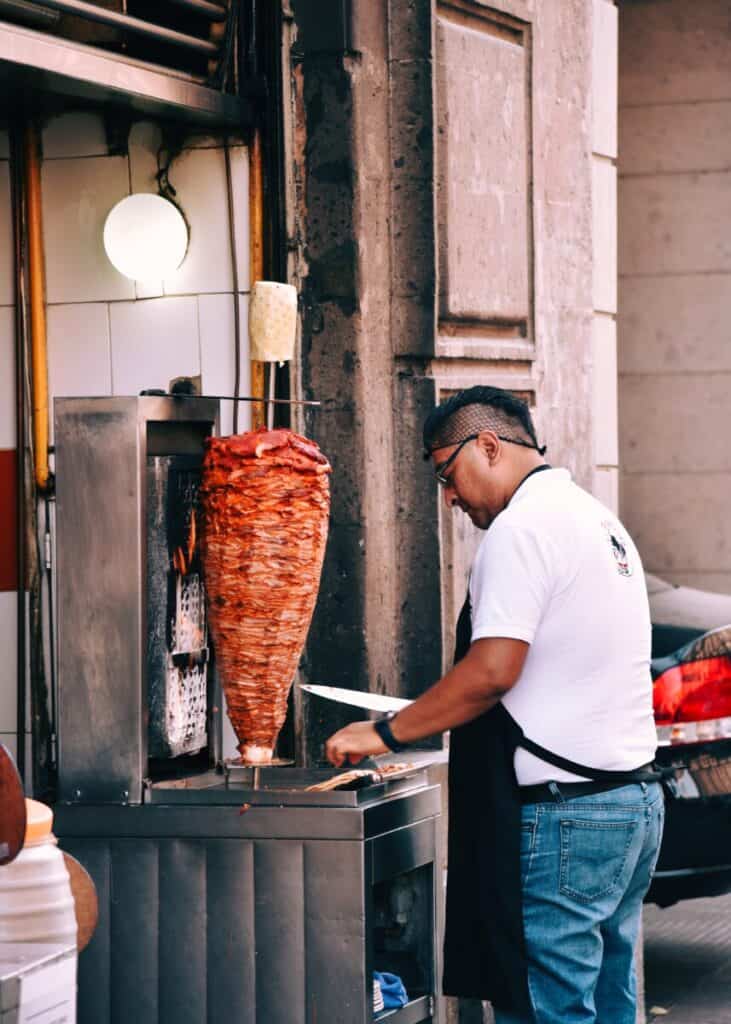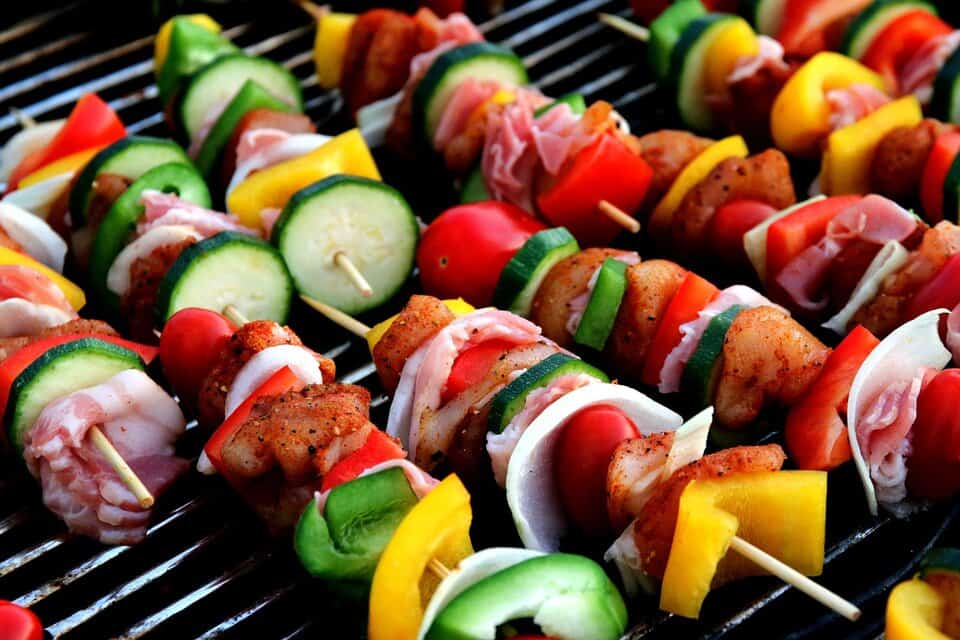Kebabs are a delicious treat and it’s not hard to understand why they have exploded in popularity as a street food. When you can get something hot, a good mixture of protein, fat, and carbs, and a snack that just satisfies you with something hot, what’s not to love? However, it’s always important to understand potential allergy issues, and kebabs are not free of potential food-born allergies.
To the question of do kebabs have dairy or not: While individual recipes can vary most kebabs do have dairy in the form of feta cheese, an ingredient in creamy garlic sauce, or often in the meat itself as milk and/or yoghurt are used as a “sticky base” for the meat itself. Individuals with dairy allergies should stay away from kebabs.
While the are some kebabs that could be dairy free with careful use of ingredients in the sauce, not adding feta cheese, and of course being very careful with the meat that is used.
Let’s dive in further to how to decrease your chance of eating kebabs with dairy and what some alternative options to the Doner Kebab are that our lactose-intolerant friends can still enjoy.

Do Kebabs Have Dairy in Them?
Most kebabs do have dairy in them, in large part because milk treatments and yoghurt have long been used as a way to soak and flavor the meat. This obviously is a problem for people who are allergic to dairy, and most kebabs do have at least a trace of dairy based on the way they are treated. Many have even more than that because one of the best ways to bind the meat into its famously well known shape is a bonding process that uses yogurt which means there is absolutely no escaping the dairy.
So while the conventional Doner Kebab wouldn’t be considered a dairy dish, there is dairy in it. When most people ask about kebabs they’re asking about Doner kebabs followed by a small group asking about shish kebabs (which we’ll get to a moment).
The three main culprits are:
- Kebab Meat
- Creamy Garlic Sauce
- Feta cheese
So let’s go into each one more deeply.
The Kebab Meat Itself
This is the one that surprises most people, but it’s the ingredient that can’t be worked around. Think about this question that all of us have asked about Doner Kebabs at one time or another: How did they design the meat to all stick together for one giant spit?
The bonding method that takes the lamb, beef, or other meats (or all of one kind) and binds it together is almost always from a dairy/yogurt base. That means that the meat itself is likely to set off any allergies that dairy-sensitive eaters have.

Since the kebab meat is the main ingredient, this is important to know. Most people assume the meat is mostly lamb or some combination of lamb plus beef or lamb plus chicken, and they are right. But to combine these meats, it requires a binding agent and in most cases using an old school yogurt marinade is the way to do it. Which is delicious if you don’t have dairy problems, but problems if you do.
That means the kebab meat is a problem, and this is a hard one to get around when talking about street kebabs. While it’s possible to get kebab meat that is prepared without dairy, providers need to be very direct, have a lot of control over their main source, and that’s very hard to manage.
Especially if you live in a nation with fewer allergy and warning regulations that others.
SOLUTION: Be very conscientious of where you get your kebab meat from and only buy from trusted sources or make your own to have more control over the process by using separate non-dairy treated meats.
The Creamy Garlic Sauce
This is a sneaky one, but most kebabs, especially for those of us who are familiar with Doner Kebabs, it comes with a creamy garlic sauce that really ties everything together. However, that word “creamy” should be an immediate red flag if you are watching out for dairy allergies and this case is no exception.
The most common mixes that are used for a creamy garlic sauce have dairy, but if you are making your own kebabs at home then you have the option of looking for a vegan garlic sauce recipe that you like.
While I’m personally not a huge fan of a lot of vegan cooking, some of the sauces are really exceptional and the garlic sauces are included among those recipes that I use, so for an at-home solution this is a viable route.
If you’re on the street, ask to hold the sauce or go with a sauce that isn’t clearly daily based.
SOLUTION: Hold the sauce or switch out for a non-creamy sauce like hot sauce or something else that can take the place of the creamy garlic sauce or if you’re making your kebabs at home, look for vegan creamy garlic sauce recipes since those will be dairy-free.
Feta Cheese
Getting around feta cheese is simple, which is to order your kebabs with no cheese. While that’s heartbreaking for those of us who love feta cheese, and know just how much flavor it can bring to the table when tying all the ingredients of a good Doner kebab together, but if that doesn’t agree with your stomach then make sure when you order you let them know no feta.
SOLUTION: Order without the feta, which is painful to say for those of us who love feta cheese, but it’s the only solution for those with dairy issues.
Donner Kebabs Vs Shish Kebabs
The more popular kebab that most people will be familiar with in Europe and large cities in the United States, and if this is what you think of when you think of kebabs then you are going to have a much easier time avoiding dairy.
When it comes to shish kebabs or skewers, as long as there isn’t a yogurt marinade for the chicken, lamb, pork, or beef then you aren’t going to have to worry about dairy.

Cooking at home does give more control over potential allergy situations but it does make the smell of a delicious kebab shop a bit of a challenge when passing by on the street.
Looking at Common International Kebabs (Know Your Kebab House Options)
If you find yourself traveling internationally, chances are that many things labeled kebabs won’t be the familiar Doner style kebabs you might be used to. I’m among this group, as where I grew up in the Midwest of the United States kebabs were basically synonymous with grilled skewers. So imagine my surprise when my first urban kebab shop involved a giant rotating piece of meat that was sliced from to make my meal.
If you’re traveling internationally there are many different localized types, styles, and recipes with kebabs and it’s important to know the common ingredients and recipes and what they have.
Some local Turkish kebabs that you will need to avoid if you have dairy issues include:
- Ali Nazik
- Hunkar Begendi
- Sis
- Cop Sis
- Yufkali version of Sac Kebabi
- Watch for cheese sprinkled on Beyti or simit kebabs
These generally have dairy or are commonly prepared with dairy via yogurt marinade or milk-based bonding agents.
How to Get Dairy-Free Kebabs
The long and the short of it in this situation is that you need to know the source of your kebab meat. You can choose to hold the feta or not use sauce (or make your own without any dairy products) however there’s no way to get around how the kebab meat is processed. If you want to make absolutely sure that the kebab meat being used is not bonded using milk and/or yogurt.
Unfortunately this means that most street Donner Kebabs are going to be off limits. As this Allergen Chart from an American kebab chain shows, dairy tends to pop up in multiple ways and multiple ingredients, so if you’re going a Doner Kebab route versus a skewer or shish kebab route, then you need to control every aspect of the kebab which pretty much means making your own from scratch at home so you can replace conventional kebab meat on the giant skewers with lamb, beef, or your preferred meat of choice at home.
Beyond that, if your dairy allergies are serious, then this might be an amazing food that unfortunately you just need to pass on for safety’s sake. It’s the one way to make sure you don’t have to deal with the danger of dairy when it comes to kebabs.
Other Kebab Articles You May Enjoy
